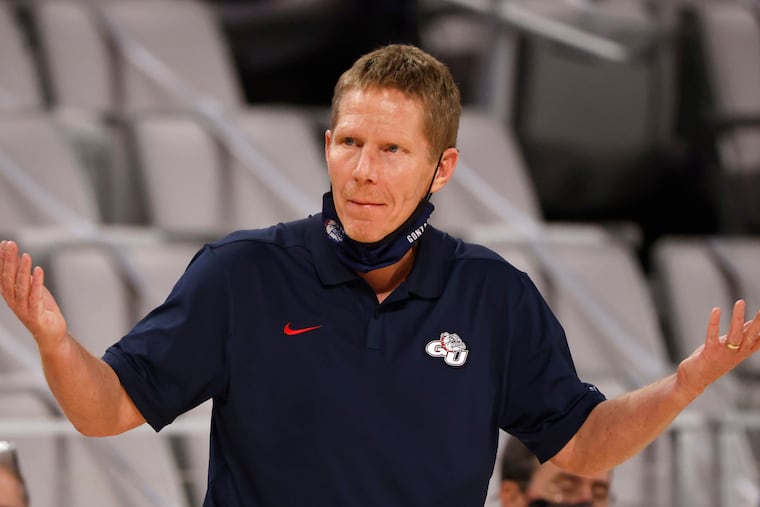Gonzaga is March Madness’ best story, unbeaten and genuinely great. Does anyone care? | Mike Sielski
College basketball doesn't have the cachet it once did, but the Bulldogs are unbeaten and deserve more attention.

Nowadays, it’s never quite correct to suggest that there’s an interesting development or story that no one’s paying attention to, because in our never-ending news cycle, in the most remote corners of cyberspace, every interesting development or story has at least one person paying close attention to it. But really, on the whole, shouldn’t Gonzaga be a bigger deal?
Look, I know the pandemic is canceling some games and keeping the arenas empty, or mostly empty, for all the other ones. And I know pressing forward with March Madness only reinforces the reality that the NCAA is a greedy, bureaucratic blob with a condescending, often paternalistic posture toward the athletes who make all that precious revenue generation possible. I get it, and I’ll get back to that. Just indulge me for a moment on the Zags.
They’re 26-0, and when CBS holds its selection show Sunday night to announce the field of 68, they’ll hear their name called as the No. 1 overall seed in the NCAA Tournament. They lead the country in scoring (92.1 points per game) and field-goal percentage (.551). They beat four top-20 teams within their first seven games. According to the comprehensive and indispensable database KenPom.com, their adjusted efficiency rating — the measurement of how much better or worse they are compared to an average Division I team — is +37.92, which is the highest figure since KenPom introduced the metric in 2002. They’re not a good team. They’re a great team, with a shot to be the first Division I squad to complete an unbeaten season since Indiana in 1975-76. And … crickets.
» READ MORE: The greatest play in St. Joe’s history helped inspire the term ‘March Madness’ 40 years ago | Mike Jensen
The reasons for the silence aren’t difficult to discern. One is broader and endemic to all of college basketball, and it has become a cliche, but it’s a cliche because it’s true: The sport doesn’t have the same collective hold on us, the same popularity among the public, that it once did, back when more great players stayed in school longer. That’s not to say players shouldn’t have the freedom to leave early or skip college altogether to play in the NBA (they should) or that the condition of college basketball should be a primary concern of theirs (it shouldn’t), only that the world has changed. The general perception now — doesn’t matter whether the perception is right or wrong — is that college basketball matters just one month of the year: this month.
Another reason is intrinsic to Gonzaga. For the 22 seasons that Mark Few has been their head coach, the Bulldogs have been a terrific program, winning at least 23 games every year, advancing to the round of 16 or beyond nine times, reaching the 2017 title game. But they’ve never won a national championship. They’ve become a default bridesmaid, not quite a blue blood. Gonzaga? Will probably fall short again. Like always. If there’s some Zag fatigue, it would be understandable.
» READ MORE: Why was Phil Martelli the head coach for the end of Michigan’s game? | Mike Jensen
But the biggest factors are time and place. Gonzaga is a small Jesuit university in Spokane, Wash., far from the country’s major media centers as it is, and the limits that the pandemic has placed on reporting — everything Zoom calls and phone calls, little to nothing in person — have made telling the Bulldogs’ story even more challenging. Remember the 2003-04 St. Joseph’s Hawks, with Jameer Nelson and Delonte West and Phil Martelli, capturing the country’s imagination by winning their first 27 games? Martelli turned his program into an open book that season, welcoming everyone in, sitting down for every interview.
Few and Gonzaga can’t do that now, even if they wanted to, and based on Martelli’s experience, maybe they wouldn’t want to. Xavier routed St. Joe’s in the Atlantic 10 Tournament that year, ending the Hawks’ unbeaten streak.
The attention “may have become tiring to the players, because we weren’t as sharp,” Martelli told me in a 2017 interview. “We didn’t play a very good game against Xavier, and we needed a very good game because [Xavier] went to the Elite 8. We were coming off six weeks of the circus coming to town.”
There has been no media circus this season, for any team. Maybe that gives Gonzaga a unique advantage entering this NCAA Tournament. Maybe, because of the more demanding kinds of tension and exhaustion that COVID-19 has created, Gonzaga can better bear the pressure of maintaining perfection. Martelli is close to Few, and he has said that he knows the approach that Few takes with the Bulldogs: “Let’s be better today. Let’s improve. If you keep improving, you want to be playing your best basketball at the end of the year.” Maybe this March, they will. And maybe someone, finally, will notice.